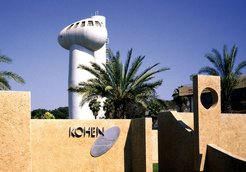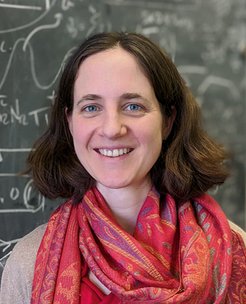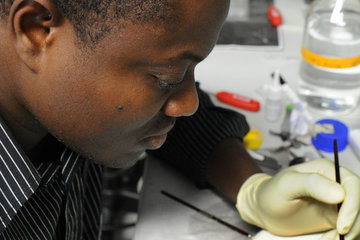Among friends
The physicist Elina Fuchs spent four years conducting research at the Weizmann Institute in Israel after receiving a scholarship from the Minerva Stiftung, a subsidiary from the Max Planck Society. She reports on generous hospitality, unusual public holidays and colleagues who were happy to help.

On the first day, we were given a taste of the incredible hospitality in Israel. A colleague collected us at the airport and gave us a short guided tour of the campus site. When we entered our apartment that evening in October 2015, we saw that someone had filled the refrigerator with food. It turned out that the secretary had bought food for us, so that we would have enough to eat the next day, when the shops were due to close early before the start of the Shabbat. My husband and I were immediately made to feel welcome.
We are both physicists and had both been given a job at the Weizmann Institute in Rehovot. For researchers, Israel is a paradise for a number of different reasons. The laboratories and the infrastructure are phenomenal, and there are plenty of opportunities for networking as well. Since we weren’t far away, we met with particle physicists from Tel Aviv, Haifa, Jerusalem and Be’er Sheva nearly every week, and discussed new research. Also, guest scientists were very often invited to the Institute, and it was great to be able to discuss ideas with them and make contacts.
In my research, I focus on which particles might exist beyond the Standard Model, and how existing models can be tested and excluded. I am particularly interested in how the properties of the Higgs boson change in new models. Discovered in 2012, it is an elementary particle which helps give other particles their mass. I’m also interested in any new particles we could be searching for. As it happened, a new model was presented just before I arrived, and my colleagues and I were able to use it to produce some very interesting results. I also got to be involved in the development of a new method at the interface between particle and atomic physics.

Israel is also a good place for pregnant women and young parents. Children are given a very high priority in a nation with the highest birthrate of all industrial countries (3.1). Since nearly all Israelis serve in the army before they study, with the women serving for two years, and the men for three, it’s no exception for doctoral students to have a child. In fact, it’s generally the rule. During my pregnancy and after the birth of our daughter, we benefited from flexible working hours, working from home and the Institute kindergarten. We were also offered help by individual colleagues.One Weizmann employee, whom we always came across on the train in the morning, gave us huge quantities of baby clothes. And when our daughter was born, two colleagues brought home-made food to our door. Of course, the greatest experience was the birth of our daughter.
We were also very moved by the various festivities and family dinners to which we were invited. One colleague invited us to celebrate Pesach (Passover) with him and his family twice. This is the equivalent of a professor inviting a postdoc from another country to spend Christmas Eve at home with their family.
Overall, I found the Jewish holidays very interesting. The biggest “culture shock” was Passover. This commemorates the departure from Egypt, which is why most Jews do not eat leavened food, such as bread. A religious neighbor asked us to buy his entire stock of cornflakes, toast and spaghetti for a token amount, since he was not allowed to own leavened food. After Passover, he bought everything back, insisting that he pay more than we had paid him. In the four years I spent in Israel, I had a few surprises when it came to the way people behaved. If you see someone approaching you on the sidewalk, it’s better to get out of the way, otherwise they might simply barge into you. In Israel, it appears to be socially acceptable to talk loudly on the phone in buses and trains, or to watch films without headphones.
Overall, I really enjoyed the scientific and cultural and human experiences during my stay, and can thoroughly recommend a visit to Israel, whether as a tourist or a researcher. You’ll discover delicious dishes, see breathtaking landscapes and be astonished by places of historical interest. You’ll be smothered in hospitality – and on Yom Kippur, the most important national holiday, when the country comes to a standstill, you can cycle along the freeway.
For information on the Minerva Stiftung, see: minerva.mpg.de/













